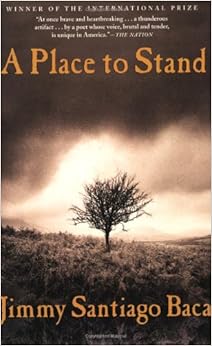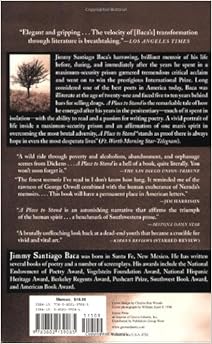Amazon.com Review
Anyone who doubts the power of the written word to transform a life will know better after reading poet Jimmy Santiago Baca's wrenching memoir of his troubled youth and the five-year jail stint that turned him around.
When he enters New Mexico's Florence State Prison in 1973, convicted on a drug charge, Baca is 21 and has a long history of trouble with the law. There's no reason to think jail will do anything but turn him into a hardened criminal, and standing up for himself with guards and menacing fellow cons quickly gains him a reputation as a troublemaker. But there have already been hints that this turbulent young man is looking for a way out, as he painstakingly spells out a poem from a clerk's college textbook while awaiting trial or unsuccessfully tries to get permission to take classes in prison.
When a volunteer from a religious group sends him a letter, contact with the written word unleashes something in Baca, who starts writing letters and poems with the aid of a dictionary. Reading literature shows him possibilities for understanding his painful family background and expressing his feelings. Poetry literally saves him from being a murderer, as Baca stands over another convict with an illegal weapon, ready to finish him off, and hears "the voices of Neruda and Lorca... praising life as sacred and challenging me: How can you kill and still be a poet?" Baca has a year to go on his sentence, but the reader knows at that point he has made a choice that will alter his destiny.
Without softening the brutality of life in jail, Baca expresses great tenderness for the men there who helped him and affirms his commitment to writing poetry for them, "telling the truth about the life that prisoners have to endure." --Wendy Smith
--This text refers to an out of print or unavailable edition of this title.
From Publishers Weekly
While readers may find Baca's poetry more dazzling than this prose memoir about how he became a poet, the author still manages to capture both the reader's interest and sympathies. Baca traverses his life, starting with his childhood in rural New Mexico where both parents essentially abandoned him his adolescence in "juvee" halls and his days as a drug dealer. The story leads up to an account of five years in a maximum-security prison in Arizona, and the unusual personal transformation that occurs there through his learning to read and write; eventually, he discovers his poetic voice. The text is structured like a conversion narrative in which Baca's past symbolizes all that is unhealthy and his poetry-oriented future is filled with the hope and optimism that come from discovering something divine in the midst of darkness. The darkness is often literal, as when Baca is describing his lengthy solitary confinements. He also recounts the intricacies of prison politics, in which failure to gain respect and alliances forged with the wrong people can mean death. Oddly, certain story lines are simply dropped along the way, such as his charge that the prison was lacing his food with strong psychoactive drugs. It is too bad that Baca's prose is frequently flat ("Poetry enhanced my self-respect. It provided me with a path for exploring possibilities for life's enrichment that I follow to this day"), especially when reflecting upon abstract topics, since the content of his story is so interesting and his poetry simply shines. (July) Forecast: Baca has won a Pushcart Prize, among other awards, including his title as a one-time champion of the International Poetry Slam. A 12-city tour will win him fans and sell more books.
Copyright 2001 Cahners Business Information, Inc.
--This text refers to an out of print or unavailable edition of this title.







